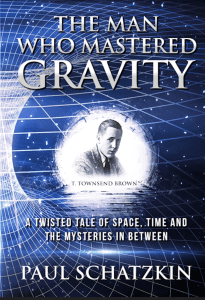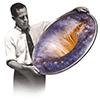…. there is a new book!
(if you have arrived at this page because you’re looking for a page from the ‘old book,’ we regret to inform that material is no longer accessible, because….)

It only took 13 years (!) but the finished (i.e. edited, proofread and indexed) version of authorized biography of T. Townsend Brown has been completed. After extensive editing and re-writing, the new version is currently undergoing careful proofreading and will be ready for publication in the first quarter of 2023.
A bit of how all that came to pass can be found here.
The unexpurgated (and unedited) first-draft manuscript, which was released in 2009 under the name of Defying Gravity: The Parallel Universe of T. Townsend Brown has been withdrawn from circulation. That’s why you are looking at this page. Hopefully all links to the ‘old’ book will be redirected here.
The new version of the book has a new title, it is now
The Man Who Mastered Gravity:
A Twisted Tale of Space, Time,
and the Mysteries In Between
If you are an agent, editor, or publisher or publicist interested in representing or publishing this extraordinary story, please contact the author to request a proposal. Or click here to read the concept statement from that proposal.
Fill out this form if you’d like an occasional notification via email re: the progress on the project and release date:
In the meantime, you are welcome to avail yourself to the Preface that begins the book, or join the wide-ranging discussion in our forums.
Thank you for your interest.
Paul Schatzkin,
author of The Man Who Mastered Gravity
*
